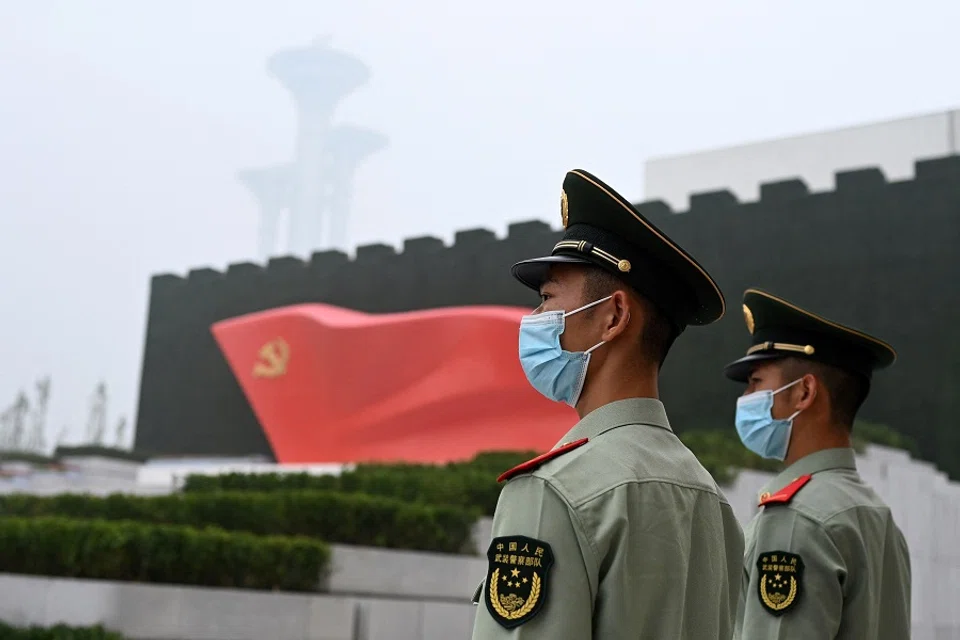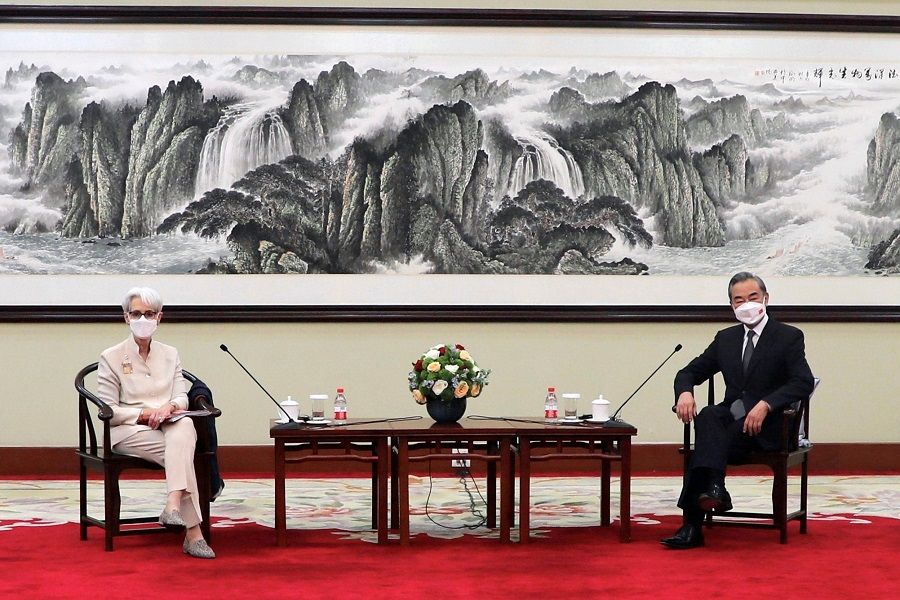Tianjin meeting: China-US relations enter 'break-in period'

Top Chinese and US diplomats met face-to-face for the second time this year on 26 July, with their encounter culminating in a tense and difficult six hour-meeting in China's Tianjin.
In a sequel to the China-US Alaska meeting which took place in March, US Deputy Secretary of State Wendy Sherman separately met with Chinese Vice Foreign Minister Xie Feng then Chinese State Councilor and Foreign Minister Wang Yi. The Tianjin meeting could be said to be more explosive than the Alaska one, with the Chinese side seemingly prepared to drop all pretence of cordiality. Wang even said before the meeting that China would be ready to give the US "a good tutorial" on "how to get along with other countries on an equal footing".
Lecturing stance
There was a reversal of roles as China played "lecturer" to the US. China had announced sanctions on seven American citizens and entities prior to the meeting. During and after the meeting, China strongly publicised and highlighted Xie's criticisms of the US for "demonising" China so as to "shift [attention away from the US's] domestic public discontent over political, economic and social issues". He said it seemed as if "the US side has nothing to talk about except about China" and that the US wanted to do "all the bad deeds" but take "all the benefits".
Xie also pointed out that the US's "rules-based international order" is an effort by the West to frame their own rules as international ones, and apply "the law of the jungle" to the world where might is right and the big bullies the small. He accused the US of being the "inventor, and patent and intellectual property owner of coercive diplomacy".

Not only did China hit out at the US with a thorough list of accusations which was unprecedented, it put forth two other lists - a 16-point List of US Wrongdoings That Must Stop and a ten-point List of Key Individual Cases that China Has Concerns With. In stark contrast, the US side did not release much information.
Observers are split between pessimistic and relatively optimistic views about the outcomes of the Tianjin meeting.
China has tried to make concessions during the Trump era in exchange for results in negotiations. It is no longer hopeful and now believes that dialogue with the US is becoming meaningless.
Not concrete, but steps nonetheless
The pessimists believe that China and the US have failed to converse or to find a way to have a breakthrough in resolving their huge differences. China is greatly disappointed to see that while the approach may be different, the Biden administration's China policy of containment is not very different from that of the previous Trump administration. China has tried to make concessions during the Trump era in exchange for results in negotiations. It is no longer hopeful and now believes that dialogue with the US is becoming meaningless.
The optimists think that having a conversation is better than having nothing at all, and it is unlikely that the squabbling continued behind closed doors. Besides, making a list is also better than not having one. Now that the consequences of taking certain actions are laid bare, the parties can move into negotiations and this could signify a small step forward in talking things over.

Drew Thompson, former director for China, Taiwan and Mongolia in the US's Office of the Secretary of Defense (OSD) and current visiting senior research fellow at the Lee Kuan Yew School of Public Policy at the National University of Singapore, told The New York Times that China is "taking a maximalist approach" to the US-China relationship, and Washington's primary goal has shifted to achieving a "deepening understanding of China's positions, reducing the potential for misperception, and avoiding miscalculation that could lead to outright conflict".
Such relatively optimistic views are corroborated by the contrasting attitudes of the Chinese and American officials which were tense before the meeting but measured and even friendly after the meeting. A US Department of State spokesperson said that both parties had "a frank and open discussion about a range of issues" at the Tianjin meeting and also discussed "ways to set terms for responsible management of the US-China relationship". On the other hand, a Chinese foreign ministry spokesperson said that the Tianjin meeting was an "important diplomatic interaction" and both parties had "deep and thorough conversations and enhanced mutual understanding".
On 28 July, the new Chinese ambassador to the US Qin Gang arrived in the US, unexpectedly injecting a breath of fresh air into tense China-US relations. In his speech, he contrasted Henry Kissinger's secret visit to China during the Cold War with his own open and public flight to the US to assume his role, sending the message that "the door of China-US relations, which is already open, cannot be closed". He promised to work with all sectors of the US to bring China-US relations back on track and to turn win-win cooperation and peaceful coexistence "from a possibility into a reality".
As for China's "system of socialism with Chinese characteristics", the US made no response, highlighting the fact that this is the biggest and most fundamental difference of all.
Reiteration of redlines
Without a doubt, it would take more than nice words and positivity to salvage China-US relations. In fact, what the Tianjin meeting has accomplished is yet another round of contentious reiterations of each other's redlines. The three redlines that Wang listed were: one, the US "must not challenge, slander or even attempt to subvert the path and system of socialism with Chinese characteristics"; two, the US "must not attempt to obstruct or interrupt China's development process"; and three, the US "must not infringe upon China's state sovereignty, or even damage China's territorial integrity".

Out of these redlines, the US has responded to the second and the third, but it is clear that the two countries have very different readings of the situation and premises. In terms of sovereignty, while the Biden administration does not support Taiwan independence, it is promoting closer official relations between Taiwan and the US. As for whether the US is obstructing China's development process, Sherman said that while the US believes in the importance of China's development and the improvement of the lives of its people, China needs to do so in accordance with international rules. She also asserted that China must understand that "human rights are not just an internal matter" but are "a global commitment which they [China] have signed up for".
These are the concrete differences between China and the US. As for China's "system of socialism with Chinese characteristics", the US made no response, highlighting the fact that this is the biggest and most fundamental difference of all.
China and the US have entered into a "break-in period" of adjustment after much difficulty, and this period would be extremely tumultuous and long.
China seems to have left no room for retreat during the Tianjin meeting. It can be said that both pessimistic and optimistic interpretations of the meeting are reasonable. China and the US understand that the differences between them can no longer be avoided and they are also aware that the world, including themselves, will have to pay a hefty price if they break up. Hence, they understand the need for dialogue regardless of the extent of their difference and the difficulty in discussions. This is good news for the rest of the world and it is also better not to choose a side.
The possibility of a meeting between the presidents of China and the US in October did not come up during the Tianjin meeting. We do not know if the meeting will actually come to pass. But that is not crucial anymore, as the important thing is that China and the US have entered into a "break-in period" of adjustment after much difficulty, and this period would be extremely tumultuous and long.
